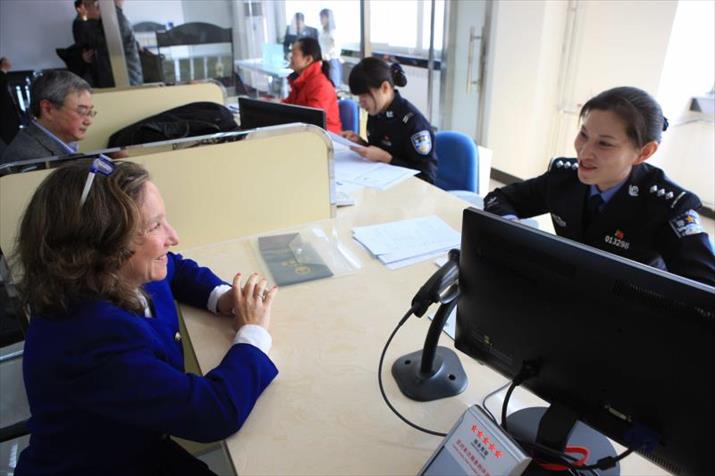|
||||||
|
||||||
| Home Nation World Business Opinion Lifestyle Multimedia Documents Special Reports Africa Travel |
|
||||||
|
||||||
| Home Nation World Business Opinion Lifestyle Multimedia Documents Special Reports Africa Travel |
| Nation |
| Still a Land of Milk and Honey |
| Foreigners looking for jobs in China get heartened by new policy relaxation |
| By Cao Qingqing & Sudeshna Sarkar | NO. 16 APRIL 20, 2017 |
 A special service center is established in Beijing to offer permanent residence services to foreigners in the Zhongguancun science and technology district on March 1, 2016 (XINHUA)
When ABC correspondent Jim Laurie first visited China in 1978, he remembers the term used to describe foreigners living in China: laowai. They needed to have a "foreigners' registration" card and if they wanted to drive outside Beijing, they also needed a foreigner's travel permit. He still has his old permit, numbered 208420. But when Laurie visited more recently in 2015, he found a massive change. He attended a job fair for foreigners and found applicants ranging from an American master's degree student to an aspiring Russian radio host to a Turkish construction worker. This year, the fairs are going to be even more crowded and diverse with further relaxations in the Chinese Government's policy for recruiting fresh foreign graduates.Less restrictions On January 6, the ministries of human resources and social security, foreign affairs, and education announced that foreign graduates with a master's degree or above from a university in China can apply for work visas within one year of graduation. Foreign graduates with the same qualifications from "well-known universities overseas" can also apply for jobs in China within one year of graduation. To get the one-year work visa, they need to get a job with a Chinese company in an area matching their degree and coming with a salary meeting market standards. Also, their expertise must meet the local demand for skills. In addition, they should be over 18 and have no criminal record. Earlier, international students in China and students with foreign degrees needed to have a minimum of two years' experience working outside China. The new measure comes after trendsetter Shanghai began allowing overseas students who had postgraduated from universities in Shanghai to apply for employment visas and residence permits without needing two years' work experience from May 1, 2016. "This policy change is a recognition that if China wants to expand its international higher education capacity further, it must leverage the attractiveness of its massive, globalized employment market among foreign students seeking to start careers," Eric Skuse, research manager at Shanghai-based market intelligence company Emerging Strategy, told The Pie News, an online business analysis provider for professionals in international education. Analysts say the policy would also see more international students heading for Chinese universities. In 2015, there were 390,000 international students in China, according to the Ministry of Education. The policy relaxation was received by Rocky, a Cameroonian student at Huzhou University in Zhejiang Province—who has given himself the nickname to spare his Chinese acquaintances the difficulty of pronouncing his name—with mixed feelings. Rocky is happy for himself since he has been teaching Chinese youngsters between the ages of 2 and 6 years old English during college breaks and wants to stay on after he finishes his studies to teach full-time. But the 28-year-old is sad on account of a friend who applied last year for a job looking specifically for French-speaking Africans but was rejected because she did not have the two years' work experience required at that time. "She missed it by months," Rocky said dolefully. But then his face brightened up. "I must call her and tell her to apply again," he said excitedly.  Feuba Hermann (COURTESY OF FEUBA HERMANN)
Challenges But working in China is still not going to be entirely a bed of roses for foreign graduates because the relaxed policy will mean more competition as well—from Chinese students. This is also going to be an attractive tool for China to stop its brain drain. The government has been seeking to attract Chinese students who go abroad for education to return home after they finish their studies, and the strategy has been producing results. In 2015, according to the Ministry of Education, 409,100 students returned from overseas studies, indicating a 12-percent increase on 2014. "Their major competitors will be Chinese overseas returnees who are bilingual or even trilingual, so language is a key. If they want to get a job, they have to speak good Chinese," Jill Tang, founder of CareerXFactor, a company recruiting graduates with foreign degrees, told The Pie News. "This policy might even encourage the first generation of Chinese migrants who moved overseas to send their kids back to China for studying and working." Besides jobs, the government is also encouraging foreigners to undertake entrepreneurial enterprises in China. In January 2016, the Ministry of Public Security issued 20 regulations to facilitate foreigners' work, residence as well as entrepreneurship in China. From March 1 that year, foreign students of universities in Beijing are allowed to start businesses in Zhongguancun in Beijing, China's Silicon Valley, as long as they indicate they would be involved in entrepreneurship in their study visa. Foreigners who are members of such start-ups while having no work permit can apply for a private affair visa marked entrepreneurship with guarantee documents. The government has also begun cutting red tape in business license application procedures and has promised to further simplify the process in the future while more sectors are opening up to foreign investors. Feuba Hermann has already started his own business in Beijing just two months after graduating from Beijing Foreign Studies University (BFSU). "I'm happy because I have finally realized my dream to settle down in China," the 29-year-old told Beijing Review. Six years ago the Cameroonian won a Chinese speaking contest held by the Confucius Institute in Yaounde, the capital city of Cameroon. In his speech My Chinese Dream, Hermnann talked about his wish of coming to China to pursue a professional career. One and a half years later, he got admission to BFSU for a master's degree. As soon as he graduated, he started the paperwork to launch a startup, a translation services company, and now has a five-year business visa. Although his company has just been launched and he still faces many difficulties, Hermann sees golden opportunities in China. He believes that as a large economy still developing fast, China holds great prospects for both Chinese and foreigners. "The population of China is 1.3 billion. It means a very big market. My country only has 27 million people, which is equivalent only to the population of Beijing," Hermann said. "That's why I decided to found my company in China." Copyedited by Bryan Michael Galvan Comments to zanjifang@bjreview.com |
About Us | Contact Us | Advertise with Us | Subscribe
|
||
| Copyright Beijing Review All rights reserved 京ICP备08005356号 京公网安备110102005860号 |